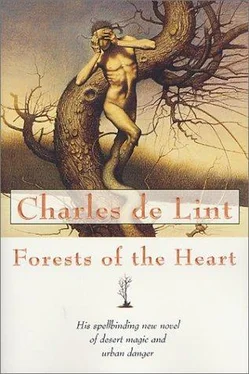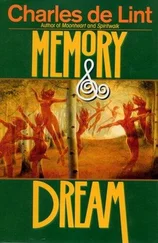Hunter put the palm of his hand against his side.
“Being nasty doesn’t also make them supernatural,” he said.
“But where do they live? How do they live? All they do is speak bloody Gaelic, so how do they get by?”
“They spoke to me in English,” Hunter said. “With a thick accent, I’ll grant you, but it was still English.”
“Fine. But that doesn’t change the otherness of them.”
“And I still say—”
“I know, I know. But ever since I listened to Donal go on about them last night, I’ve had a bad feeling that all this shite Fergus and my da’ talked about could be real.”
“So we need to rescue Donal from them.”
“I don’t think that can be done,” Miki told him. “You know Donal. That moroseness of his isn’t all an act. If he thinks he sees a way out, a way to get even with the world, he’d take it. And he’s so bloody stubborn.”
“Unlike you.”
That won him a faint smile.
“I’m only stubborn when I’m right,” she said.
“And you’re always right.”
The smile grew a little. “As good as,” she said, before it went away again.
“So what is it you want to do?” Hunter asked.
“It’s not a want so much as a need.”
Hunter nodded encouragingly.
“I don’t want to see them take what isn’t theirs from those who were here before them.”
“But that’s how it works,” Hunter said. “Isn’t history one long summation of conquests and the like? The Celts didn’t originate in Ireland—they took it away from someone else.”
“That doesn’t make it right.”
“No. But… well, why wait until now? What happened when these Gentry showed up with the original conquering Celts?”
“Well, my da’ had something to say about that, too—when he was sober, or at least not so drunk that he could still talk. See, the genii loci preside over a particular place. When the landowners change, those original spirits remain. It’s only how they’re perceived that changes. They’re the same spirits, but they wear different names, different shapes. But for some reason, when the famine and all the troubles drove our people out of Ireland to cross the Atlantic, some of these originally localized spirits made the journey as well. The Europeans were able to displace the original inhabitants of this land, but it appears the Gentry weren’t as successful with the local spirits. Or so my da’ said.
“They’ve been able to claim the cities for their own, but I’d guess it’s only because the local spirits aren’t interested in streets and buildings. The Gentry have spent so much time walking among us, that a forest of concrete and steel buildings doesn’t trouble them the way they would spirits more in tune with their natural environment. But now…”
“Now they want it all,” Hunter said.
“And they think that calling up the Glasduine will give it to them.”
“The what?”
“Glasduine. It’s an old name for a Green Man.”
“And he’s this Summer King you were talking about earlier?”
Miki shrugged. “According to folklore and tradition, they’re not the same, though if you follow the threads you can see where they meet from time to time in figures such as Robin Hood. But it doesn’t matter to the Gentry. When I think back to all the things Uncle Fergus attributed to them, it was just one big borrowed mess that’d take either a scholar or a madman to decipher.”
She fell silent again and this time Hunter didn’t know what to say. None of what she was telling him made much sense in the view he’d always held of the world. And, just supposing it was real, why get involved in a struggle that was so far out of their league? If the local spirits were half as powerful as the Gentry were supposed to be…
He put his hand against his side again. There was nothing supernatural about his pain—nor in how he’d gotten it. But the hard man who’d hit him definitely fit in with Miki’s description of them being mean-spirited.
“Aw, Christ,” Miki said suddenly. She drank off the remainder of her cold tea, stuck her cigarettes in her pocket and stood up. “I feel like a bloody fool, going on like this. It’s just Donal’s got me going and I can’t tell up from down anymore. Last night, it was like seeing himself again—my da’, in all his drunken, stupid glory.”
Hunter stood up as she started to put on her coat.
Miki shook her head. “I half expected him to take a swing at me, but I guess he knows I wouldn’t even begin to stand for that sort of shite.”
“Let me walk you home,” Hunter said.
“Yeah, I don’t suppose I’d be much use around the shop today.”
“It’s not that.”
She put her hand on his arm. “I know. Thanks for putting up with me.”
“I’ve heard worse.”
“Oh, please. I’d like to know from who.”
“I meant in terms of going through a bad time,” Hunter said.
Miki cocked her head. “You’re not going to go all sage and wise on me now, are you?”
She almost sounded like her old self.
“I doubt I could pull off either,” he told her.
“Yeah, you’d at least need white hair and a beard. But you’ve got a deep enough voice…”
They paid their bill and walked back through the cold streets to her apartment with Miki cracking jokes along the way. Hunter wasn’t fooled by her sudden change of mood. It was just her way of dealing with… well, everything, he supposed. From when he first met her as a kid, busking, living on the street, she’d always been as cheerful as Donal was morose. He’d just never stopped to think about what that cheerfulness might be hiding.
By the time they were climbing the stairs onto the porch of her building she seemed completely like her old self, though Hunter didn’t think he’d look at her in quite the same way again. Not with what he knew now.
“So you see,” she was saying as she opened the front door into the foyer, “it’s probably better this way. I don’t doubt I was getting on Donal’s nerves as much as he was getting on…”
Her voice trailed off and it took Hunter a moment to realize what was the matter. Then the smell hit him, a thick musty reek of wet animal fur and urine and worse. He stepped past Miki, breathing through his mouth, and looked around. The foyer was as spotless as ever.
“Where’s it coming from?” he said.
He turned to look at Miki, but she made no reply. She stood frozen by the door, a stricken expression on her face. And then he knew, just as she did, unable to explain how, he just knew. He took the keys from her fingers and crossed the foyer to her door, unlocked it, pushed it open, almost gagging as an enormous wave of the horrible stench came rolling out into the foyer.
He’d been prepared for bad, but this was far worse than his imagination had been able to call up. It looked like a storm, no, like a hurricane had torn through the apartment. The furniture was all overturned or smashed, upholstery shredded. CDs, books, magazines torn apart and thrown about as though spun in a tornado. Feces were smeared on the walls, where the drywall hadn’t been kicked in. Urine dripped in long streaks among the smears, puddled on the floors.
Christ, Hunter thought, gagging on the horrible reek. What had they done? Robbed a sewage plant?
All that remained untouched were the windows—to keep the stench locked in, he realized. But nothing else was in one piece. Even some of the baseboards and molding had been torn up and broken.
Then he saw her accordion, the Paolo Soprani, torn in two at the bellows, the keyboards on either side smashed in, bass and treble reeds broken and scattered around the ruins of the instrument that lay in a pool of urine. And just to make sure the message of hate and disdain was absolutely understood, someone had taken a huge dump right on the shattered remains of the instrument. Even if it could be repaired, who would want to?
Читать дальше












